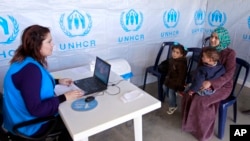GENEVA —
A new report by the United Nations refugee agency (UNHCR) says health services for hundreds of thousands of Syrian refugees are increasingly overstretched. The UNHCR says limited funds are limiting the health care refugees are receiving.
The report is the first assessment of the health situation of Syrian refugees in neighboring Iraq, Jordan and Lebanon. The report says the Syria refugee crisis is putting an enormous strain on the health systems and refugees are having difficulty getting the care they need.
The report, which covers the first three months of this year, shows refugees need treatment for injuries, psychological illnesses and communicable diseases, as well as chronic diseases such as diabetes and hypertension.
The U.N. refugee agency estimates more than one million refugees are in Iraq, Jordan and Lebanon.
The report finds the health situation of Syrian refugees is different from that found among refugees elsewhere who come from low-income countries such as Somalia. The report says Syrian refugees are not reported to be suffering from high death rates or acute malnutrition.
UNHCR Chief Medical Expert Paul Spiegel says this is because the demographics of the Syrian refugee population are very similar to those in European countries.
"Therefore, you have a lot of older people with chronic diseases and the whole spectrum with many of them taking chronic medications... many of them, who had renal [kidney] dialysis in Syria or were taking cancer treatment and have to cross the border. So with this amount of people crossing and the burden of disease, which is very high and also compared with Somalia, the cost is extremely high for chronic diseases and the secondary and tertiary referral care. It makes it extremely difficult to cope," said Spiegel.
The UNHCR has received 55 percent funds it asked for in an appeal it launched early this year for more than $1 billion.
The lack of funding is forcing aid agencies to make some very hard choices regarding health care, Spiegel said in an interview with VOA. People with primary health care diseases and emergency life-threatening cases are given precedence over other sick patients.
"We have very open criteria looking at prognosis, looking at cost, looking at consistent cost, meaning we know dialysis you do not pay for a month and then you stop. You pay forever," he said. "Then very hard decisions are made and many are not funded. And therefore, they either have to find other funding and in some cases, yes, these people may die."
The UNHCR report finds many of the Syrian refugees are suffering from mental health illness. It says nearly 22 percent of people in Jordan's Avatar camp have anxiety disorders, 16 percent have schizophrenia, and nine percent post-traumatic stress disorder. In Lebanon, it says some 400 mental health consultations are conducted weekly.
The report is the first assessment of the health situation of Syrian refugees in neighboring Iraq, Jordan and Lebanon. The report says the Syria refugee crisis is putting an enormous strain on the health systems and refugees are having difficulty getting the care they need.
The report, which covers the first three months of this year, shows refugees need treatment for injuries, psychological illnesses and communicable diseases, as well as chronic diseases such as diabetes and hypertension.
The U.N. refugee agency estimates more than one million refugees are in Iraq, Jordan and Lebanon.
The report finds the health situation of Syrian refugees is different from that found among refugees elsewhere who come from low-income countries such as Somalia. The report says Syrian refugees are not reported to be suffering from high death rates or acute malnutrition.
UNHCR Chief Medical Expert Paul Spiegel says this is because the demographics of the Syrian refugee population are very similar to those in European countries.
"Therefore, you have a lot of older people with chronic diseases and the whole spectrum with many of them taking chronic medications... many of them, who had renal [kidney] dialysis in Syria or were taking cancer treatment and have to cross the border. So with this amount of people crossing and the burden of disease, which is very high and also compared with Somalia, the cost is extremely high for chronic diseases and the secondary and tertiary referral care. It makes it extremely difficult to cope," said Spiegel.
The UNHCR has received 55 percent funds it asked for in an appeal it launched early this year for more than $1 billion.
The lack of funding is forcing aid agencies to make some very hard choices regarding health care, Spiegel said in an interview with VOA. People with primary health care diseases and emergency life-threatening cases are given precedence over other sick patients.
"We have very open criteria looking at prognosis, looking at cost, looking at consistent cost, meaning we know dialysis you do not pay for a month and then you stop. You pay forever," he said. "Then very hard decisions are made and many are not funded. And therefore, they either have to find other funding and in some cases, yes, these people may die."
The UNHCR report finds many of the Syrian refugees are suffering from mental health illness. It says nearly 22 percent of people in Jordan's Avatar camp have anxiety disorders, 16 percent have schizophrenia, and nine percent post-traumatic stress disorder. In Lebanon, it says some 400 mental health consultations are conducted weekly.




